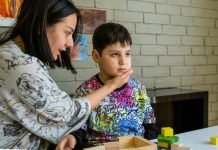
In a study from Rutgers University, scientists found brain-wave data collected during a hearing test routinely given to newborns could help clinicians spot neurodevelopmental disorders such as autism in early infancy.
They found that newborns who later received an autism spectrum disorder (ASD) diagnosis had pronounced delays in their brainstem’s responses to sounds.
On average, these newborns had a 1.76-millisecond lag—in a system that operates at a microsecond timescale—compared to newborns who developed neurotypically.
These newborns may have difficulty integrating sound with other sensory streams like vision, movement, and pain because of limited access to sound frequency.
Furthermore, they may have difficulty communicating socially and learning languages.
The research suggests a possible approach for developing a universal screening tool for neurodevelopmental disorders with new avenues for targeted personalized treatments.
In the study, the researchers examined fluctuations in waveforms—which are often discarded across repetitions—recorded by the Auditory Brainstem Response (ABR) test that assesses hearing.
In this test, clinicians play clicks to sleeping babies, whose brain response is recorded using soft electrodes.
The results may explain differences in language acquisition, sensory processing, and motor control, which are all fundamental to social interactions and communication as the baby grows and matures.
It also explains why young autistic children have excess noise in their movements, with repetitions of actions, or “stimming,” and unexpected responses to various sensory stimuli.
In the experiment, the team first standardized the waveforms to remove anatomical differences, such as head circumference, as a source of variability.
They then compared waveforms from infants who were later diagnosed with an autism spectrum disorder to a similar number of babies who were not.
The babies who would go on to receive an ASD diagnosis showed consistently delayed responses to the clicks and reduced access to sound frequencies.
The team says by the time those with ASD receive their diagnosis in the U.S. and even later abroad, their nervous systems developed compensatory coping mechanisms and circuitry different from neurotypical babies.
Researchers can catch these differences early enough to support the system to process sensory signals within the ranges and timescales that will coincide with those of neurotypical individuals, thus enabling information processing and communication between two systems.
If you care about autism, please read about studies about a new cause of autism, and vitamin D could help lower the risk of autoimmune diseases.
For more information about health, please see recent studies about rare blood clots after COVID-19 vaccination, and gut health plays a role in autism.
The study was conducted by professor Elizabeth Torres et al and published in PNAS Nexus.
Copyright © 2023 Knowridge Science Report. All rights reserved.



